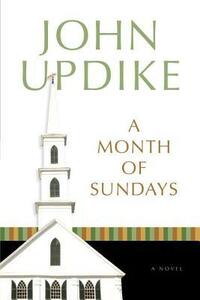Take a photo of a barcode or cover
funny
lighthearted
fast-paced
Plot or Character Driven:
Character
Strong character development:
No
Loveable characters:
No
Diverse cast of characters:
No
Flaws of characters a main focus:
No
The first time I’ve heard of a month, without any other days of the week, besides Sunday! For a minister, I guess, and the bailiwick or occupation that entitles them to work on Sunday – it’s a drag, I mean dragging your kids to Church. Kids actually want to participate. Adults have to be accompanied by a minor. Can they bring kids to drag races?
“Also the paper said there was going to be a comet. Or some such heavenly portent.”
It’s a free luncheon, or free refreshments, though I’ve never heard of a free meal before. usually cookies and sometimes a barista will serve coffee/tea and DIY sugar packages. Often a donut or a bagel. It’s nice you don’t have to sit through it on an empty stomach.
“Blessed, blessed are the poor in spirit.”
The few times I’ve congregated on Sunday morning, back in Mesa, Arizona and not since then; the preacher at least tried to be amusing, incorporating some performance arts including a fish tank. Nonetheless VBS still had fun back in my boyhood youth group days; I remember once some kid stole another kids teddy bear, and another kid stood up for the kid to make the kid give the teddy back; I was crying because, the teddy bear was mine.
In VBS it always felt kind of mysterious, like something exciting taking place. Us kids would separate into groups and go to different rooms to learn about, per instance, Jonah and the Whale, and an active simulation of being swallowed in a whales bodice. The lamps trimmed low, a tarp to cover us, like camping indoors w/ storytelling and goody-bags!
“The mirror holds a face. I do not recognize it as mine. It no more fits my inner light than the shade of a bridge lamp fits its bulb.”
As kids we had fun, I had friends who went to church, in fact my best friend, Kenny, got me involved; sometimes we went to the Frisco river and raced boats, one summer we even did some canoeing and witnessed channel catfish gliding alongside the raft. Some of the best times of my life I’d had with the youth group, & nonetheless I became a serious metalhead.
“Also the paper said there was going to be a comet. Or some such heavenly portent.”
It’s a free luncheon, or free refreshments, though I’ve never heard of a free meal before. usually cookies and sometimes a barista will serve coffee/tea and DIY sugar packages. Often a donut or a bagel. It’s nice you don’t have to sit through it on an empty stomach.
“Blessed, blessed are the poor in spirit.”
The few times I’ve congregated on Sunday morning, back in Mesa, Arizona and not since then; the preacher at least tried to be amusing, incorporating some performance arts including a fish tank. Nonetheless VBS still had fun back in my boyhood youth group days; I remember once some kid stole another kids teddy bear, and another kid stood up for the kid to make the kid give the teddy back; I was crying because, the teddy bear was mine.
In VBS it always felt kind of mysterious, like something exciting taking place. Us kids would separate into groups and go to different rooms to learn about, per instance, Jonah and the Whale, and an active simulation of being swallowed in a whales bodice. The lamps trimmed low, a tarp to cover us, like camping indoors w/ storytelling and goody-bags!
“The mirror holds a face. I do not recognize it as mine. It no more fits my inner light than the shade of a bridge lamp fits its bulb.”
As kids we had fun, I had friends who went to church, in fact my best friend, Kenny, got me involved; sometimes we went to the Frisco river and raced boats, one summer we even did some canoeing and witnessed channel catfish gliding alongside the raft. Some of the best times of my life I’d had with the youth group, & nonetheless I became a serious metalhead.
slow-paced
Plot or Character Driven:
Character
Diverse cast of characters:
No
Too much golf.
Moderate: Sexual content
Probably the most playful Updike I have read; clearly he had a wonderful time writing this, and I had a wonderful time reading it. Tom Marshfield may have been at the center of a scandal, but he is gleefully guilt-free in his exile. A feast of language, though the book bogged down for me in its discussion of doctrine.
The Rev. Tom Marshfield doesn't understand the ministry as I do. It's interesting to read this reflection on ministry in the 1970's before the common understanding of professional boundaries. And yet, his mistakes are familiar to the failings of many ordained leaders today. What terrifies me is how he supports his actions through four sermons and journal reflections theologically. Barth supports his model of ministry while he abhors the doubt introduced by Tillich and others. This book leaves me wondering if a little bit of doubt in the ministry is actually a really good thing.
dark
funny
reflective
medium-paced
Plot or Character Driven:
Character
Strong character development:
No
Loveable characters:
No
Diverse cast of characters:
No
Flaws of characters a main focus:
Yes
dark
slow-paced
It's a fun book, bursting with language that is impossibly beautiful at points. The issue is that the language lacks control and didnt take me anywhere new or special. It's a book centered around moments that aren't actual moments but distractions and, at its worst, filler. It's a short book that is actually way shorter when you realize how much of it is just fucking around. It's a peculiar, flawed almost-gem. If all you're in it for is Updike's masterful writing, you'll be happy--and I was happy reading it for the most part, because goddamn can the man write--but there isn't anything touching or thoughtful about it. To be crass, this is Updike flexing his skills but not doing any actual lifting.
P.S. Golf. Motherfucking golf.
P.S. Golf. Motherfucking golf.
challenging
funny
medium-paced
Plot or Character Driven:
Character
Strong character development:
Complicated
Loveable characters:
No
Diverse cast of characters:
No
Flaws of characters a main focus:
Yes
Definitely a satire, and cleverly written. However, I wish it was more obviously satirical. There were a lot of problematic plot points and instances that made it kind of hard to read.
This took a while to read. It's a hard read morally, and I was wary to enjoy it too much. (If you did not finish this book for moral reasons I find that commendable - something I usually don't for a book.) I think in the end, Updike was playing with us a bit. He turns the table on "you, dear reader" in this novel, especially in the last chapter. He tricks us to think we are observing, only finding out later we are participating. By taking advantage of our propensity for the salacious, he gives us time to realize we aren't much better than the flawed main character. This reveal also takes a turn as the redemption, the unveiling of who he is and who we are in our basest and most selfish desires and doubts. You don't like the character, but you are interested in where his course will take him.
The book is overty sexual. Overbearingly so in many cases. Details of sexual encounters, down to sometimes obscure sensory details, are graphic. I think Updike saw value in doing so. The occurances often come off as juvenile, revealing the sex addicted stunted nature of his main character. And he is indeed a sex addict. He slums boredom and apathy when not on some sexual hunt (or trapped in the confinment of the treatment center), but finds himself full of life in his illicit sexual exploits and pursuits.
Tom Marshfield, a doubting Thomas if ever there was one, also gives sermons throughout his stay at the reform vacaction he is put under. These are full of both cynicism and bright insight. He's aware of his shortcomings, but takes the arrogant tone of one who seemingly doesn't care. There's almost a forcefulness for us to accept it, but no repentance or sorrow on what is occuring. The hypocricy in his doubts and how they are the result, not the cause, of his sexaul dysfunction doesn't hit him. How his adoration of the sexual is a perversion of what should rightfull be adored. Although the author hints maybe he is aware. The narrator can't untangle the two, it's a complex mess, but that is demonstrating the larger issue Updike may have been paying homage to: we ourselves have corrupted adoration of God in exchanged for sex. Like the character, our loss of moral clarity has left us lost; it's hard to find the way out. Updike did a remarkable job capturing the character and dilemma, but like the adoration issue, it's hard to untangle the insightful from the salacious, so hence the 3 stars.
The book is overty sexual. Overbearingly so in many cases. Details of sexual encounters, down to sometimes obscure sensory details, are graphic. I think Updike saw value in doing so. The occurances often come off as juvenile, revealing the sex addicted stunted nature of his main character. And he is indeed a sex addict. He slums boredom and apathy when not on some sexual hunt (or trapped in the confinment of the treatment center), but finds himself full of life in his illicit sexual exploits and pursuits.
Tom Marshfield, a doubting Thomas if ever there was one, also gives sermons throughout his stay at the reform vacaction he is put under. These are full of both cynicism and bright insight. He's aware of his shortcomings, but takes the arrogant tone of one who seemingly doesn't care. There's almost a forcefulness for us to accept it, but no repentance or sorrow on what is occuring. The hypocricy in his doubts and how they are the result, not the cause, of his sexaul dysfunction doesn't hit him. How his adoration of the sexual is a perversion of what should rightfull be adored. Although the author hints maybe he is aware. The narrator can't untangle the two, it's a complex mess, but that is demonstrating the larger issue Updike may have been paying homage to: we ourselves have corrupted adoration of God in exchanged for sex. Like the character, our loss of moral clarity has left us lost; it's hard to find the way out. Updike did a remarkable job capturing the character and dilemma, but like the adoration issue, it's hard to untangle the insightful from the salacious, so hence the 3 stars.
funny
reflective
slow-paced
Plot or Character Driven:
Character
Strong character development:
No
Loveable characters:
No
Diverse cast of characters:
No
Flaws of characters a main focus:
Yes






